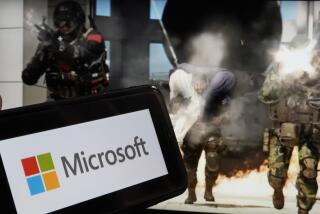SBC’s $81-Billion Purchase of Ameritech Wins FCC OK
- Share via
Federal regulators gave final approval Wednesday for SBC Communications Inc.’s $81.1-billion purchase of Ameritech Corp., a deal that would bring together two regional Bell companies to form the nation’s largest local phone company.
The approval includes an unprecedented set of 30 conditions aimed at promoting local phone competition in the regions served by Ameritech and Pacific Bell parent SBC and encouraging the development of advanced telecommunications services. The companies agreed to pay more than $2 billion in penalties if they fail to meet the conditions within a three-year period.
The combined SBC-Ameritech will have $46 billion in annual revenue and one-third of all local telephone lines, including the majority of lines in California.
The Ameritech deal is the latest in a series of acquisitions for SBC, which completed purchases of Nevada Bell and Pacific Bell in 1997 and the smaller Southern New England Telecommunications in Connecticut in 1998.
The approval by the Federal Communications Commission marks the last regulatory hurdle for the Ameritech takeover, clearing the way for the companies to close the deal, which was announced 17 months ago.
The conditions imposed “will really expedite the opening of these markets and ultimately the ability of these companies to get into long-distance,” FCC Chairman William Kennard said.
SBC and the other regional phone companies are prevented by law from offering their customers long-distance service until they prove their local markets are open to rivals.
Kennard’s view was not shared by Republican FCC members Michael Powell and Harold Furchtgott-Roth, who objected to imposing conditions on SBC.
“By this order, the commission imposes legally dubious, over-broad, potentially unenforceable, privately negotiated conditions on a merger that it is statutorily unauthorized to review,” Furchtgott-Roth said in a statement.
As part of the agreement, the conditions will apply throughout SBC’s territories, including in California, where PacBell has not yet won approval to sell long-distance service.
The FCC determined that the two companies, by combining their assets, will be a tougher competitor nationally and internationally, benefiting U.S. consumers.
“This is a great win for consumers everywhere,” SBC said in a statement.
One key condition is that the companies must compete in 30 local telephone markets in the next 2 1/2 years outside the territory they now serve in the Midwest and West or face more than $1.12 billion in fines. They could face more fines if they don’t sufficiently open their local phone markets to competition. SBC also agreed to set up a unit to provide high-speed data services to consumers.
Many of the conditions require SBC units to offer wholesale discounts to rival companies that want to lease lines and other equipment from the local phone companies.
A potentially important provision--especially in Internet-hungry California--requires SBC companies to give carriers that sell Internet connections through digital subscriber line, or DSL, technology discounted access to existing copper lines. That change will sharply lower costs for DSL competitors.
The combined company will also be required to set up uniform computer systems throughout its 13-state territory that will allow competitors to electronically sign up large volumes of customers and process other types of customer service orders. That’s a key condition that will promote local phone competition, Kennard said.
“The company got what it wanted, and the FCC got a lot more concessions than most anyone expected,” said Scott Cleland, managing director of Legg Mason Inc.’s Precursor Group. “The FCC and SBC got a big win today.”
The companies and FCC staff in June had initially hammered out a series of 26 conditions. Faced with opposition from rivals such as MCI WorldCom Inc. and AT&T; Corp., and consumer groups that said the conditions weren’t tough enough, the companies in August revised the list. The conditions agreed to Wednesday resemble those revisions.
Shares of San Antonio-based SBC rose 88 cents to close at $51.81; Chicago-based Ameritech gained $1.31 to $68. Both trade on the New York Stock Exchange.
(BEGIN TEXT OF INFOBOX / INFOGRAPHIC)
SBC Merger
A look at the $81.1-billion deal approved Wednesday that will create the nation’s largest local phone company:
* SBC: Operates under the Southwestern Bell, Pacific Bell, SNET, Nevada Bell and Cellular One brands. Has 52 million phone lines in its territory and 8.3 million wireless customers in the United States.
* Ameritech: Serves Illinois, Indiana, Michigan, Ohio and Wisconsin. Has more than 12 million phone customers and provides wireless service to 3.2 million customers.
* New markets: SBC-Ameritech will enter 30 new markets within 30 months to compete with established local phone companies, including Bell Atlantic, BellSouth and US West.
Source: Associated Press
More to Read
Inside the business of entertainment
The Wide Shot brings you news, analysis and insights on everything from streaming wars to production — and what it all means for the future.
You may occasionally receive promotional content from the Los Angeles Times.










